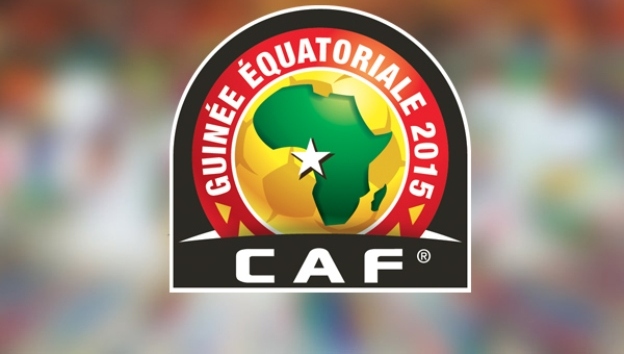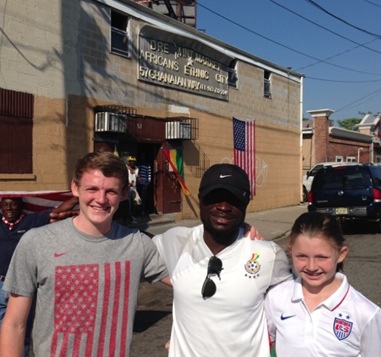Foreign white coaches’ involvement in African football dates back to the earliest days of colonialism. Beginning in the 1960s, independent African states continued to hire many Europeans (especially from the Eastern bloc and West Germany) and South Americans to manage national teams and player development programs.
This funny BBC video raises serious questions about this long-standing trend, noting the disproportionately high number of overseas coaches at the 2015 African Nations Cup. In a field of sixteen teams in Equatorial Guinea, the only local coaches on the sidelines were Honour Janza (Zambia), Florent Ibengé (DR Congo) and Shakes Mashaba (South Africa).
Category: Video
African Football in the Media

This year’s Africa Cup of Nations is underway in Equatorial Guinea. RFI talks about African football and media coverage with Peter Alegi, an authority on the game in Africa and Professor of History at Michigan State University in the United States. [full text here.]
Click below to listen to the interview. (iOS users click here.)
This week my senior history seminar “Race and Power in South African Sport” is discussing the gripping story of the Makana Football Association, the league formed by prisoners on Robben Island, apartheid’s most notorious prison. Students read More Than Just a Game: Soccer vs. Apartheid—The Most Important Soccer Story Ever Told by Chuck Korr and Marvin Close. We also watched the film by the same title, which preceded the book version of the story.
Students blog weekly about the readings as a way to reflect on the assigned material and spark discussion. “As a soccer player myself,” wrote one blogger, “the true story of what materialized on Robben Island is one of the most thought-provoking and uplifting stories I have ever come across.”
Another student blogger highlighted the role of football in bringing older and younger inmates closer together in the wake of the 1976 Soweto Uprising. The shifting demographics of the prison population sparked tensions, but eventually “The younger generation saw the quality of football that was played on the island and began to appreciate the skill and cunning that had gone into building the MFA. ‘As mutual respect began to grow, the older prisoners would sit in the quarry during lunch breaks, gaze out towards Cape Town and the mainland, and quiz the new inmates about the progress of their favourite clubs. They particularly wanted to hear about the exploits of a new black ‘super club’- the now world-famous Kaizer Chiefs’” (Korr and Close 235).
Finally, another blog post relied on a Soweto-era Robben Islander, “Patrick Lekota, who would eventually become South Africa’s Minister of Defense [. . . to sum] up the game’s importance: “Without it, we would have been so depressed. It took our mind away” (Korr & Close 234). This blog also featured the extraordinary 2010 episode of ESPN “Outside The Lines” on Robben Island football posted above. Watch. Learn. Enjoy. Share.
I settled into my seat at Fresh View Cinemas, Levy Park, in Lusaka, for the premiere of “e18hteam”—the first feature film about the history of football in Zambia—with more than a passing interest in the subject.
With generous funding from the FIFA João Havelange Research Scholarship, I have spent the past several years researching and writing the first academic history of football in Zambia as part of my doctoral studies at Michigan State University.
The cinema audience in Lusaka included football administrators, fans, members of the media, and VIPs like Shallot Scott, the wife of Zambia’s Vice President Guy Scott, and Roald Poulsen, the Danish coach who helped rebuild Zambia’s national team after the 1993 Gabon air crash that killed 18 supremely talented players.
The film is a partnership between Zambian producer Ngosa Chungu and Spanish writer, director and producer Juan Rodriguez-Briso. “e18hteam” focuses on Chipolopolo (Copper-bullets), Zambia’s national team. The narrative begins with Zambia’s famous 4-0 destruction of Italy in the 1988 Olympic tournament in South Korea. Then it turns to the tragedy that defined a generation: the 1993 Gabon air crash. The film goes on to explore the rebuilding of a new team, which (almost miraculously) reached the 1994 AFCON final against Nigeria. The narrative arc closes on an uplifting note as it documents the golden generation that won Zambia its first continental crown in 2012 in Libreville, just a few miles from the site of the crash nineteen years earlier.
“Last Week Tonight” host John Oliver explains soccer and society in England to David Letterman.
The rich win. The poor lose. And most Americans don’t care.
Except, of course, those of us who screeched about John getting the number of EPL teams wrong. Enjoy!
FC Kansas City NWSL Champions
On Sunday, FC Kansas City defeated Seattle Reign 2-1 to win the 2014 National Women’s Soccer League championship. Playing at the Reign’s home ground of Starfire Sports Stadium on an artificial surface, FCKC’s solid tactical organization, relentless collective defense, and excellent finishing proved decisive.
The league’s best teams put on an entertaining and well-played spectacle for ESPN2’s national television audience. Amy Rodriguez’s perfectly calibrated chip shot over Hope Solo opened the scoring in the 22nd minute. In a rare chance, Seattle’s Nahomi Kawasumi shockingly missed a wide open header later in the first half. But overall FCKC frustrated the Reign’s offensive play and effectively neutralized NWSL MVP Kim Little.
Ten minutes into the second half, Lauren Holiday put on a dribbling display of the finest quality in the Seattle box and generously served the ball to Rodriguez. Left inexplicably unmarked, the U.S. national team player slid into her shot to the far post for her second of the day and a 2-0 FCKC lead. Megan Rapinoe eventually pulled one back for Seattle three minutes from time. But it was not enough, as FCKC held on for a deserved victory.
The NWSL crown means that Kansas City now holds both the men’s and women’s professional titles in the United States. For a sport usually associated with the coasts, could this moment represent the beginning of a broader power shift into the interior of the country?

June 17, 2014
By Tom McCabe*
The text message came through as “URGENT.” Sylvers Owusu, a former student and player, wrote yesterday: “We just received a city permit to block off Ghanaian Way in Newark for today’s GHA vs. USA match. Please join us for a watch party! DJ Albert will provide music to entertain the crowd. Let’s go Ghana!”
The plan was now hatched: first half in Newark, and the second half a few miles away in what has been called “the cradle of American soccer.” I watched several games at the Scots American Club in Kearny in 2010, including the Algeria match punctuated by Donovan’s last-ditch winner. (I also watched Ghana knock the USA out there).
Back at the Scots Club there was a much more joyous celebration to Dempsey’s early strike [click here for video.]
Ten minutes later the Ghanaian congregation began singing a song, unrecognizable to my ears. Sylvers whispered to me: “It’s a gospel song. We need God now.” Ghana grabbed control of the game, but the USA threatened on several occasions to double the lead. It was an intense, physical start to a must-win match.
At the half-time whistle we headed outside and took in the street scenes. DJ Albert had the place jumping and after some dancing and chanting we got back into the car and headed for the Passaic River. Kearny, home to American stars (John Harkes, Tab Ramos, and Tony Meola), the Scots Club, and the second half beckoned.
We arrived ten minutes into the second half as parking was scarce around the Scots Club, but the USA still had that slim one-goal lead. The bar-end of the social club formed in 1932 was packed with people in red, white and blue. “USA” chants rang out as well as repeated frustration about how the Stars and Stripes couldn’t hold on to possession.
After Ghana leveled the score in the 82nd minute it seemed that they would go on to find the winner, but against the flow of the second half John Brooks powered home a precisely-placed Graham Zusi corner. Understandably, there was bedlam inside the Scots Club once again. Hugs, high-fives, chants, and more hugs. It was a major victory in “The Group of Death” that sets up an epic battle against Portugal on Sunday.
*Tom McCabe is an historian at Rutgers University-Newark where he teaches surveys in U.S. History, History of Newark, and History of Soccer. Follow him on Twitter at @tommccabe5. This post was originally published on his new blog Soccer Brains.